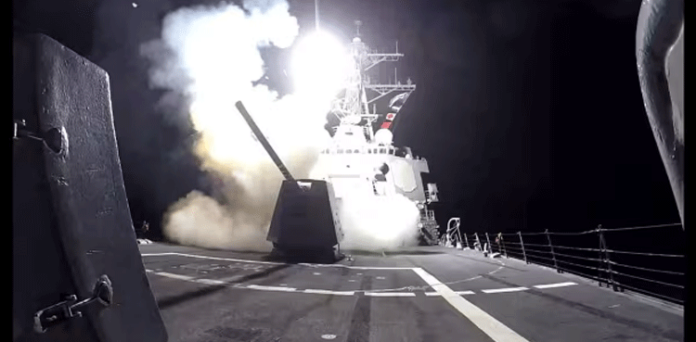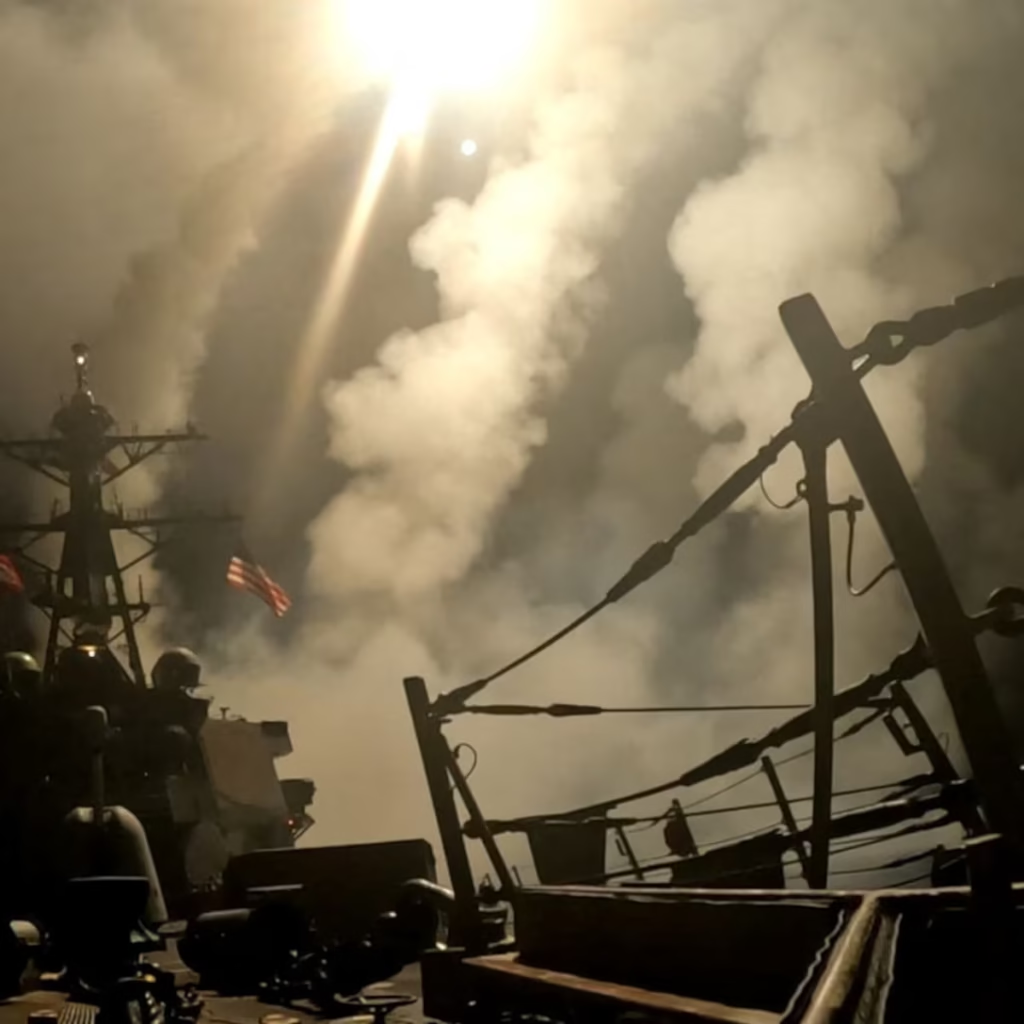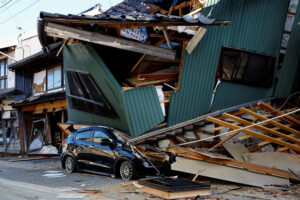U.S. Launches Massive Military Strikes Against Yemen’s Houthis Amid Rising Red Sea Tensions
In a significant escalation of military action in the Middle East, U.S. President Donald Trump launched large-scale strikes against Yemen’s Iran-aligned Houthi rebels on Saturday. The attacks, which targeted key military positions across Yemen, came in response to the group’s repeated assaults on Red Sea shipping routes, threatening global trade and security. At least 31 people were reported killed in the initial wave of strikes, with officials in Washington indicating that the campaign could extend for several weeks.
The situation in Yemen has now become a focal point of international concern, as the U.S. attempts to curb Houthi aggression while sending a clear warning to Iran, the rebels’ primary backer. Trump’s strong rhetoric underscored the gravity of the situation, making it clear that the U.S. would not tolerate further provocations in the strategically vital region.
Following the strikes, Trump directly addressed Iran, accusing it of fueling instability in Yemen and the broader region by providing financial and military support to the Houthis.
“If Iran threatens the United States, America will hold you fully accountable, and we won’t be nice about it!” Trump warned, reinforcing his administration’s hardline stance against Tehran.
The latest U.S. offensive marks the most significant American military operation in the Middle East since Trump took office. It also aligns with Washington’s broader strategy of exerting “maximum pressure” on Iran, which includes economic sanctions and diplomatic isolation.
The Houthi rebels, who control large parts of northern Yemen, have repeatedly targeted commercial and military vessels passing through the Red Sea, one of the world’s most crucial maritime corridors. The attacks have raised alarm among global powers, as Red Sea shipping lanes are vital for international trade, with nearly 12% of global trade passing through the area.
In response, Trump’s administration decided to take decisive military action. A senior U.S. official told Reuters that the campaign against the Houthis could last for weeks, depending on their reaction to the initial strikes.
“To all Houthi terrorists, YOUR TIME IS UP, AND YOUR ATTACKS MUST STOP, STARTING TODAY. IF THEY DON’T, HELL WILL RAIN DOWN UPON YOU LIKE NOTHING YOU HAVE EVER SEEN BEFORE!” Trump posted on his Truth Social platform, signaling his resolve to end the Houthi threat.
The Houthi movement, officially known as Ansar Allah, has been engaged in a long-running conflict against Yemen’s internationally recognized government, backed by a Saudi-led coalition. However, their recent escalation of maritime attacks represents a new front in the ongoing war.
The Houthis claim their assaults on Red Sea vessels are in retaliation for Western backing of their opponents in Yemen’s civil war. They argue that as long as foreign forces interfere in Yemen, they will continue striking strategic targets.
However, Washington and its allies see the Houthi attacks as an extension of Iran’s broader strategy of disrupting international trade routes. The U.S. and its Western allies believe Tehran is using the Houthis as proxies to project power in the Middle East, much like it has done with Hezbollah in Lebanon and militias in Iraq and Syria.

With the U.S. military now engaged in direct action against the Houthis, fears are growing that Yemen could become the latest flashpoint in the long-standing conflict between Washington and Tehran.
Military analysts warn that while the U.S. has overwhelming air power, defeating the Houthis won’t be easy. The rebels have survived years of Saudi-led bombardment and have continued to expand their missile and drone capabilities.
Further complicating the situation, Iran has been supplying advanced weapons technology to the Houthis, including ballistic missiles and explosive-laden drones that have been used to target Saudi Arabia, the UAE, and now Red Sea vessels.
If the strikes on Yemen continue for weeks, as Pentagon officials have hinted, Iran may decide to escalate its support for the Houthis, potentially drawing the U.S. further into the conflict.
Beyond the military and geopolitical implications, the latest U.S. airstrikes raise fresh concerns about Yemen’s worsening humanitarian crisis. Already one of the poorest nations in the Arab world, Yemen has been devastated by nearly a decade of war, with millions suffering from famine, disease, and displacement.
International aid organizations have warned that further escalation in Yemen could lead to even greater suffering for civilians, many of whom are caught between the warring factions. U.N. officials have repeatedly urged all parties to seek a diplomatic resolution rather than resorting to military force.
However, with the Houthis continuing their attacks and the U.S. determined to retaliate, hopes for a peaceful resolution appear distant.
The U.S. military strikes on Yemen have drawn mixed reactions from global powers.
- Saudi Arabia, which has been fighting the Houthis for years, welcomed the U.S. strikes, calling them a necessary step to restore security in the Red Sea.
- Iran, unsurprisingly, condemned the attacks and vowed that Washington would face “serious consequences.”
- Russia and China have called for de-escalation, warning that a prolonged military campaign could destabilize the entire region.
- The European Union expressed concern over regional security but largely supported Washington’s efforts to counter Houthi aggression.
Meanwhile, business leaders and shipping companies are increasingly alarmed about the potential disruption to global trade routes. Some have already begun rerouting vessels away from the Red Sea, adding higher costs and delays to international shipping.
- Will the Houthis back down? If they cease their attacks on Red Sea shipping, the U.S. may limit its military campaign. However, if they retaliate, further airstrikes are almost inevitable.
- How will Iran respond? If Tehran intensifies support for the Houthis, the U.S. might escalate its actions against Iranian targets, raising the risk of a broader conflict.
- What will be the long-term impact on Yemen? If fighting drags on, Yemen’s humanitarian crisis will deepen, making any future peace process even harder.
- Will Trump’s strategy work? While Trump’s administration hopes this show of force will deter further attacks, the Houthis have proven to be highly resilient fighters.
With tensions at an all-time high, the Red Sea crisis is now at a critical juncture. The coming days will determine whether Washington’s military intervention in Yemen will succeed in deterring further Houthi aggression — or whether it will spark an even larger and more dangerous conflict in the region.
The conflict in Yemen has reached a dangerous new phase injuring over 101 others, many of whom were women and children. The strikes, launched under the directive of President Donald Trump, are part of an aggressive military operation aimed at stopping Houthi attacks on Red Sea shipping routes.
As tensions mount, the Houthis have vowed to retaliate, declaring that the strikes constitute a “war crime.” The political bureau of the Iran-backed group has warned that any further escalation will be met with “escalation in return,” setting the stage for a prolonged conflict.
On Saturday night, residents in Sanaa, Yemen’s capital, reported intense bombardments that shook the city and caused significant damage to infrastructure. Among the areas hit was a Houthi-controlled compound, where powerful explosions sent shockwaves across the city.
One local resident, Abdullah Yahia, described the terrifying scene:
“The explosions were violent and shook the neighborhood like an earthquake. They terrified our women and children.”
In addition to Sanaa, Taiz, a strategic city in southwestern Yemen, was also targeted, with strikes hitting Houthi military sites. The attack on Dahyan, a town in Saada, resulted in a power station being destroyed, leading to widespread power outages.
The Houthis, who have been in control of large parts of Yemen for the past decade, have significantly escalated their naval capabilities in recent months. Since November 2023, the group has launched dozens of missile and drone attacks on ships navigating the Red Sea, severely disrupting global trade.
The U.S. Pentagon has reported that since 2023, the Houthis have attacked:
- U.S. warships – 174 times
- Commercial vessels – 145 times
Their targets have included oil tankers, cargo ships, and military vessels, forcing global shipping companies to reroute through longer and more expensive routes around southern Africa.
The Houthis claim their attacks are in solidarity with Palestinians amid Israel’s war against Hamas in Gaza. However, the U.S. views these actions as a direct threat to global commerce and regional stability.
The latest airstrikes mark a major shift in U.S. military strategy in Yemen. Under former President Joe Biden, U.S. military actions in Yemen were limited, focusing primarily on intercepting Houthi attacks rather than launching direct offensive strikes.
However, sources within the U.S. Department of Defense have confirmed that Trump has authorized a far more aggressive approach, aiming to cripple Houthi military capabilities.
The U.S. military’s Central Command (CENTCOM), which oversees operations in the Middle East, described the current strikes as part of a “large-scale, sustained military operation” targeting key Houthi infrastructure and weapons depots.

A Message to Iran
The U.S. strikes in Yemen also serve as a direct warning to Iran, which has been accused of providing the Houthis with missiles, drones, and financial aid.
U.S. Defense Secretary Pete Hegseth made Washington’s stance clear in a statement on X (formerly Twitter):
“Houthi attacks on American ships & aircraft (and our troops!) will not be tolerated; and Iran, their benefactor, is on notice. Freedom of Navigation will be restored.”
Trump’s Ultimatum: “Lethal Force Until the Objective Is Achieved”
President Donald Trump has taken a hardline approach, vowing to continue military action against Yemen’s Houthis until their ability to threaten Red Sea shipping is completely eliminated.
In a Truth Social post, Trump declared:
“The Houthi attack on American vessels will not be tolerated. We will use overwhelming lethal force until we have achieved our objective.”
This signals that U.S. airstrikes in Yemen could continue for weeks or even months, depending on the Houthis’ response.
Following the U.S. military action in Yemen, Iran’s Foreign Minister Abbas Araqchi strongly condemned the attacks, accusing Washington of waging an illegal war.
He posted a statement on X, saying:
“The U.S. government has no authority, or business, dictating Iranian foreign policy. End support for Israeli genocide and terrorism. Stop killing Yemeni people.”
Iran’s United Nations mission has not officially responded, but Tehran has made it clear that it sees the U.S. strikes on Yemen as an escalation of hostilities that could further destabilize the region.
In an apparent effort to manage broader geopolitical risks, U.S. Secretary of State Marco Rubio spoke with Russian Foreign Minister Sergei Lavrov on Saturday, informing him about the Yemen operation.
Russia, which has relied on Iranian weapons in its Ukraine war effort, has not publicly criticized the strikes but has called for “restraint and de-escalation.”
Will Yemen Become Another Battlefield for U.S.-Iran Conflict?
Analysts warn that the U.S. intervention in Yemen could spiral into a broader conflict involving Iran, Hezbollah, and other Tehran-backed militias.
In recent years, U.S.-Iran tensions have escalated due to:
- Iran’s nuclear program – Tehran is enriching uranium at levels close to weapons-grade.
- Israeli strikes on Iranian military sites – Recent airstrikes have targeted Iran’s missile production facilities.
- Iran’s support for proxy groups – From Hamas in Gaza to militias in Iraq and Syria, Iran has strengthened its regional allies.
While Iran supports Yemen’s Houthis, Tehran is also dealing with growing domestic instability. Four Iranian officials told Reuters that economic hardships have sparked massive public anger, raising fears of protests similar to those in 2022 and 2023.
These concerns may limit Iran’s willingness to engage in direct military escalation over Yemen—though it will likely continue arming the Houthis behind the scenes.
The latest U.S. airstrikes in Yemen are expected to exacerbate an already dire humanitarian situation.
For nearly a decade, Yemen has suffered from:
- Severe famine – Millions face food shortages due to blockades and war.
- Collapsed healthcare system – Hospitals lack basic medical supplies.
- Mass displacement – Over 4 million Yemenis have been displaced.
Humanitarian organizations, including the United Nations, have urged all parties to prioritize diplomacy to prevent further suffering.
The U.S. military appears committed to an extended air campaign in Yemen, while the Houthis have vowed revenge attacks. Key questions remain:
- Will the Houthis escalate attacks on U.S. forces? If they do, Washington may increase its military operations even further.
- Will Iran provide more advanced weaponry? Tehran could secretly send sophisticated drones and missiles to Yemen.
- Will international diplomacy step in? With Russia and China urging de-escalation, a diplomatic solution may be possible.
For now, the war in Yemen has taken a new and dangerous turn. The coming weeks will determine whether this is a limited U.S. military operation or the start of a prolonged Middle Eastern conflict.










